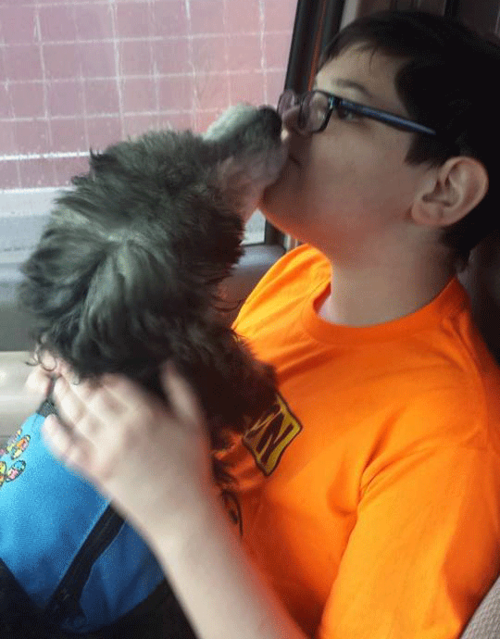|
Above and beyond being a constant companion, a service dogs can help improve social interactions and relationships, expand verbal and nonverbal communication, teach life skills, alert & interrupt repetitive behaviors, increase interest in activities and decrease stress within the family. A PAWS Dog doesn’t pass judgment, but breaks into the world of autism and becomes a crucial part of the family’s life.
Not everyone will benefit from a service dog. We screen and evaluate each situation individually. Our goal is to ensure a successful match for the client handler, the family and the service dog. This section will provide you with information on the application and approval process. Currently, we our focus is on working with families in the Kansas City region. However, we will consider and consult on a case by case basis with families outside of the region. The first step is to fill out and send in your application. After reviewing the application, we will schedule a phone conference to help you decide if an autism service dog is a good addition for your family's situation and make recommendations on which agencies would best fit your needs. Approximately 75% of those interested are referred to other agencies. Paws 4 Autism will never be the agency that trains for everything. We focus on working with children and young adults who are moderate and high-functioning on the autism spectrum, those challenged with PTSD and specifically cases of Ehler Danlos (EDS) and Dysautonomia Post Orthostatic Tachycardia Syndrome (D-POTS).. |
Demand for specialized service dogs is growing rapidly. These dogs go everywhere with their recipients. Service dogs assist with all activities, including attending school. Under the American’s with Disabilities Act (ADA), there are no exceptions to where a service dog is allowed; all public places must allow access. It is important however that the child’s school be cooperative. Once approved, PAWS can assist families with this process.
While some agencies place their dogs with families at the puppy stage, we believe the dogs should reach adulthood and be fully trained first. It is not necessary to receive the dog at a very young age in order for bonding to occur. It is also important to remember that while the dog will become a trusted member or your family, its purpose is as a service animal, not a pet. It is through that relationship that mutual respect and affection develop.
While some agencies place their dogs with families at the puppy stage, we believe the dogs should reach adulthood and be fully trained first. It is not necessary to receive the dog at a very young age in order for bonding to occur. It is also important to remember that while the dog will become a trusted member or your family, its purpose is as a service animal, not a pet. It is through that relationship that mutual respect and affection develop.
